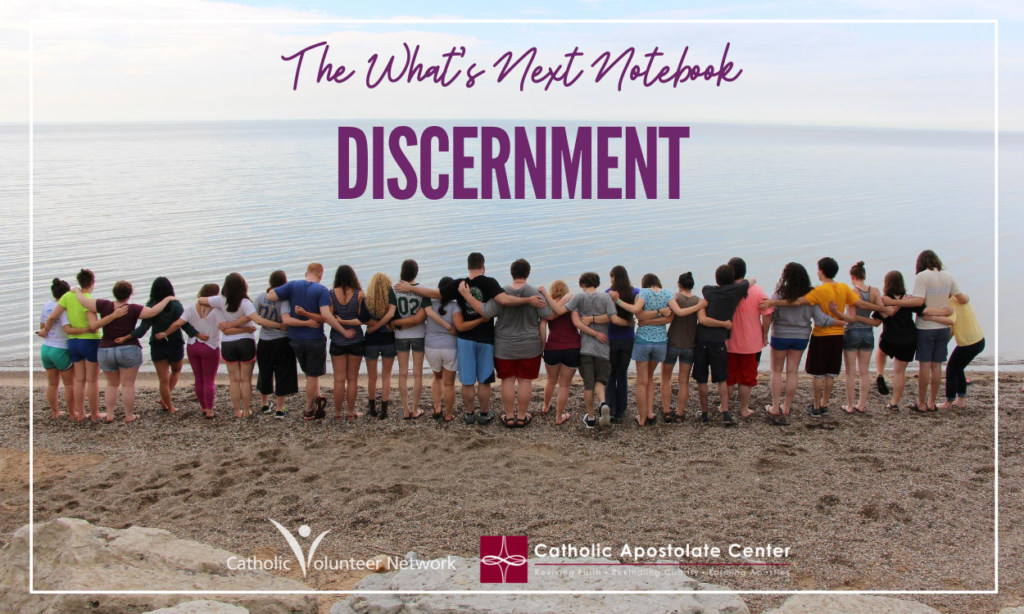This blog is part of our #WhatsNext series for former volunteers, inspired by the What’s Next Notebook resource from Catholic Volunteer Network and Catholic Apostolate Center. In each blog, we will explore helpful tips for looking back on your volunteer experience, saying goodbye, determining your next steps, and sustaining your spiritual growth during the transition to “life after volunteering.”
Opening Thoughts
“Our only desire and our one choice should be this: I want and I choose what better leads to God’s deepening life in me.” – Saint Ignatius of Loyola
Introduction
No matter where you are in the process of deciding what’s next, the tools of discernment will help you make your decisions with confidence.
It’s easy to understand that God’s will for our lives is to make choices that position us to utilize our gifts, grow emotionally and spiritually, and serve others. But what happens when we have several good options to choose from, when the choice is not a matter of deciding between right and wrong, but rather choosing between different paths that appear equally important and fulfilling? Saint Ignatius of Loyola spent a lot of time asking himself this same question, and the conclusions he came to are still helpful to us today, five hundred years later.
Discernment is simply defined as making choices in the context of faith. It is a way of sorting through all the noise, pressure, and confusion in your life to hear God’s voice. It’s never a one-time decision; it is a manner of living. Pay attention to the process, there is much you can learn about yourself and God through it.
Ignatian discernment is built on the key premise that God is not distant, but instead present in our lives and highly interested in the decisions we make. This practice is meant for those who already have an established faith and wish to grow in it. Rather than pushing our feelings aside to make decisions purely based on facts and logic, discernment encourages us to tune in to our feelings and see how they are guiding us. Saint Ignatius created a habit of looking at his options and paying attention to his emotions whenever he had an important decision to make. He soon discovered that as long as he was in a healthy place, spiritually, his gut feelings were pretty accurate. He felt peace about the right decisions (consolation) and a sense of discomfort about the wrong ones (desolation). This, he determined, was God’s spirit within him.
Tips for Discernment
- Give yourself time. You will not be able to discern properly when you are experiencing feelings of anxiety, fear, or desperation. Similarly, try as best you can to set your own time frame for making decisions and do not allow outside influences to pressure you into making a decision before you feel ready.
- Share about your decision with a trusted friend. It may be more comfortable to keep things inside until you’ve made a decision, but talking it over with a friend will often bring a sense of reassurance and clarity.
- Seek silence. In a fast-paced and noisy world, it may be difficult to slow down and hear the quiet voice of God within you. Be intentional about making time and space for quiet reflection on a regular basis. You may find it helpful to arrive at Mass a half hour early and spend that time in prayer, or take a long walk in a secluded park to experience God in nature. Just be sure to leave your cell phone and other electronics at home.
- Keep a journal. As you discern next steps over the coming days, try to capture your thoughts and feelings by logging them in a journal. If you enjoy writing longhand, consider investing in a quality hardcover journal. If you find digital tools to be more helpful, consider tracking your thoughts in a “Notes” or “Memo” style app on your phone. Collecting your thoughts in one place can be an empowering exercise and can help you feel increased agency in your decision-making process.
Web Resources
- Catholic Apostolate Center has collected a number of helpful vocational discernment resources on their website. Check them out at: www.catholicapostolatecenter.org/vocational-discernment-resources.html
- Sacred Space is a virtual prayer and reflection resource informed by Ignatian Spirituality. Check out their site for daily Gospel reflections paired with bite-sized pieces of discernment advice: https://www.sacredspace.ie/
Recommended Reads
- “What’s Your Decision? How to Make Choices with Confidence and Clarity” by J. Michael Sparough, SJ, Jim Manney, and Tim Hipskind, SJ, Loyola Press, 2010.
- “Inner Compass: An Invitation to Ignatian Spirituality” by Margaret Silf, Loyola Press, 1999.
Closing Thoughts
“We will discover that we find our deepest desire not in our arriving, but in our journeying; not in the finding, but in the searching.” – Margaret Silf
Thank you for diving into our #WhatsNext series! Next week, we will explore the theme of Discernment – Choosing a Career, in which we will discuss how your volunteer experience and your natural strengths and weaknesses can help inform your professional path.
Read more blogs in this series by visiting our blog and clicking the #WhatsNext icon!
Be sure to register and receive all our resources for former volunteers, including the What’s Next Notebook and our Weekly Job Bank, by clicking here!





 Thousands of faith-based service opportunities can be at your fingertips with the RESPONSE. Download the latest edition today!
Thousands of faith-based service opportunities can be at your fingertips with the RESPONSE. Download the latest edition today!
